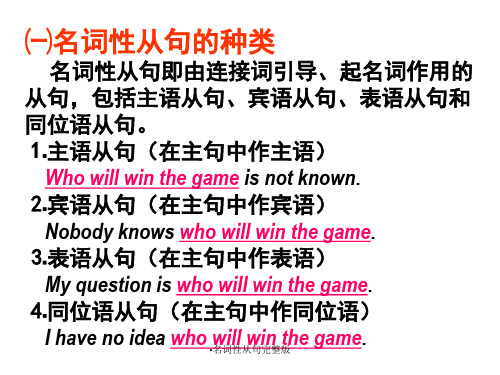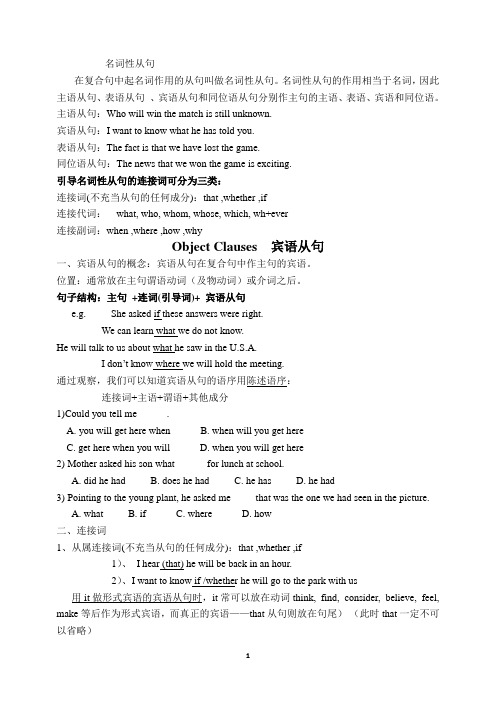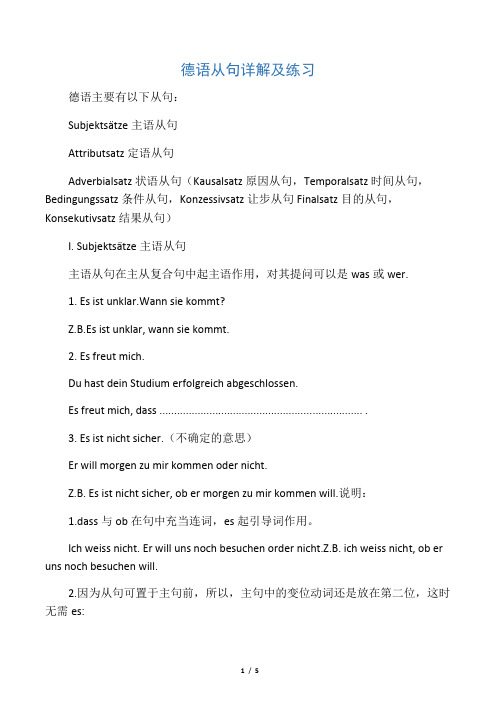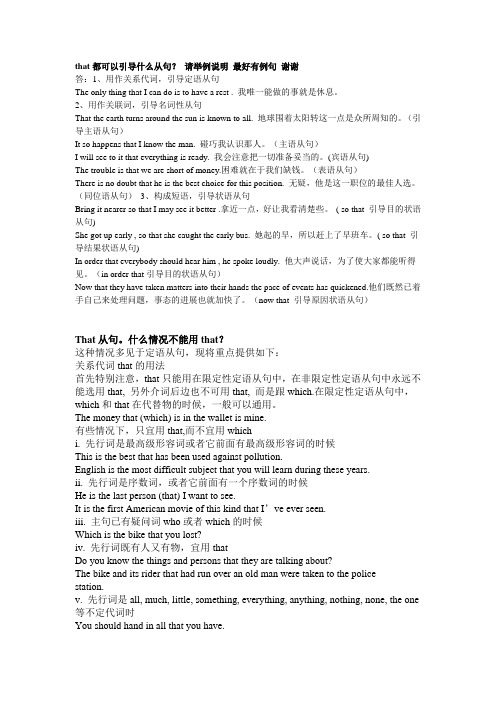(完整版)主语从句
(word完整版)名词性从句 例句

英语写作提高—-名词性从句例句一.主语从句1、Who was responsible for the accident is not yet clear.2、Why he left so abruptly is not known to any of us。
3、When he’ll be back depends much on the weather。
4、Whether she comes or not doesn’t concern me。
5、Wherever he once lived is well preserved.6、It is natural that they should have different views.7、It was quite plain that she didn't want come。
8、It’s a pity that he can’t swim.9、It was a fearful disappointment to your mother that you didn’t come yesterday。
10、It happened that she wasn’t in that day.11、It struck me that we ought to make a new plan.12、It was rumored that he was suffering from a tone in the kidney。
13、It is estimated that 25 million school lunches are sold each day.14、Where I spend my summer is none of your business .15、It’s doubtful whether the payment is legal.16、It was a question whether he should get married。
名词性从句完整版经典实用

(2)It +be+形容词 (necessary/natural/wonderful/likely/strange/important/certain等 )+that从句
eg.It is wonderful that all of you have passed the difficult exam.
•名词性从句完整版
•13
误:If Mary really heard him is really doubtful. 正:Whether Mary really heard him is really doubtful. 正:It was doubtful if /whether Mary really heard him.
•名词性从句完整版
⒈连词:引导从句但不作任何成分。
⑴that—没有意义,引导主/宾/表/同位语从句。 ①It is said that there will be a party tonight. ②They say (that) there will be a party tonight. ③Why he failed was that he made a vital mistake. ④The key that he succeeded lied in his hard work. ⑵if—是否,引导宾语从句,主语从句。
2 It was a pity that you failed in the exam.
•名词性从句完整版
用it 作形式主语的结构
• It+be+名词(短语)(a pity/a shame/a surprise/no wonder等)+ that从句
ห้องสมุดไป่ตู้
eg. It is a pity that you have missed the wonderful lecture.
完整版从句分类专题

备注
可用 on which
Nanjing is the place where I was 可用
born.
in which
南京是我的出生地。
I can't imagine the reason why he refused my offer.我想象不出 他拒绝我帮助的理由。
可用 for which
PREV.
one minute, please ask the persons who have missed the train.如果你 想知道一分钟的价值,请去问问那 些错过火车的人。
宾语
Mr. Smith is the person with whom I am working.
史密斯先生就是与我共事的那个人。
个用which
borowed from the library which was
newly open to us.让我给你看看那本
我刚刚从新开的图书馆借来的小说。
PREV.
NEXT
NEXT
二 定语从句中that与which, who, whom的用法区别
情况
用法说明
例句
只用that的 情况
①先行词为all, everything, anything, nothing, little, much等 不定代词时;
②先行词被all, any, every, each, much, little, no, some, few等修 饰时;
3 This is the best film that I have ever seen. 这是我看过的最好的电影。 4 We talked about the persons and things that we remembered. 我们谈起了 我们记得的人和事。
(完整版)名词性从句知识点总结

(完整版)名词性从句知识点总结名词性从句知识点总结名词性从句是指在复合句中充当名词的从句。
它可以在句子中充当主语、宾语、表语或同位语。
以下是名词性从句的几个重要知识点:主语从句主语从句在句子中充当主语的角色。
它引导的从句通常由关联词that引导,但有时可以省略。
例如:- That he stole the money is a fact.宾语从句宾语从句在句子中充当宾语的角色。
它通常由关联词that引导,但也可以由其他关联词如whether, if, who, whom等引导。
例如:- She asked me if I had finished my homework.if I had finished my homework.- I wonder whether he will pass the exam.whether he will pass the exam.表语从句表语从句在句子中充当表语的角色。
表语从句通常由关联词that引导,但有时也可以由其他关联词如whether, if, what等引导。
例如:- His biggest concern is that he might lose his job.that he might lose his job.- The question is what we should do next.what we should do next.同位语从句同位语从句在句子中充当同位语的角色,用来解释或说明名词的具体内容。
同位语从句通常由关联词that引导,但也可以由其他关联词如whether, if等引导。
例如:- The fact that he lied to us is very disappointing.that he lied to us is very disappointing.- My hope is that we can find a solution to the problem.that we can find a solution to the problem.以上是名词性从句的一些常见知识点总结。
(完整版)人教版高一英语必修3宾语从句与表语从句详细讲解及练习

名词性从句在复合句中起名词作用的从句叫做名词性从句。
名词性从句的作用相当于名词,因此主语从句、表语从句、宾语从句和同位语从句分别作主句的主语、表语、宾语和同位语。
主语从句:Who will win the match is still unknown.宾语从句:I want to know what he has told you.表语从句:The fact is that we have lost the game.同位语从句:The news that we won the game is exciting.引导名词性从句的连接词可分为三类:连接词(不充当从句的任何成分):that ,whether ,if连接代词:what, who, whom, whose, which, wh+ever连接副词:when ,where ,how ,whyObject Clauses 宾语从句一、宾语从句的概念:宾语从句在复合句中作主句的宾语。
位置:通常放在主句谓语动词(及物动词)或介词之后。
句子结构:主句+连词(引导词)+ 宾语从句e.g. She asked if these answers were right.We can learn what we do not know.He will talk to us about what he saw in the U.S.A.I don’t know where we will hold the meeting.通过观察,我们可以知道宾语从句的语序用陈述语序:连接词+主语+谓语+其他成分1)Could you tell me______.A. you will get here whenB. when will you get hereC. get here when you willD. when you will get here2) Mother asked his son what ______for lunch at school.A. did he hadB. does he hadC. he hasD. he had3) Pointing to the young plant, he asked me ____ that was the one we had seen in the picture.A. whatB. ifC. whereD. how二、连接词1、从属连接词(不充当从句的任何成分):that ,whether ,if1)、I hear (that) he will be back in an hour.2)、I want to know if /whether he will go to the park with us用it做形式宾语的宾语从句时,it常可以放在动词think, find, consider, believe, feel, make等后作为形式宾语,而真正的宾语——that从句则放在句尾)(此时that一定不可以省略)I think it necessary that you should read English aloud.We heard it that she would get married next month.3、that从句位于句首时,that不可省略。
(完整版)英语名词性从句知识归纳

名词性从句知识归纳名词性从句是指在句子中相当于名词的从句,主要包括主语从句、宾语从句、表语从句和同位语从句。
名词性从句不是修饰性从句,而是复合句中的主干。
e.g. That the boy failed again in the exam disappointed his mother. (主语从句)I know that he is writing his composition in his room. (宾语从句)The question is how we can finish it on time. (表语从句)The fact that some Chinese are still poor is really a great problem. (同位语从句)一、宾语从句---及物动词、介词、部分形容词(certain, sure, glad, afraid, frightened, happy, pleased, sad, sorry, surprised, upset, satisfied等)后e.g. I believe (that) he is honest. (that不充当从句内的任何成分,一般情况可省略)I’m glad that you are satisfied with your job. (that不充当从句内的任何成分)He doesn’t care if/whether it isn’t a fine day. (if/whether不充当从句内的任何成分) Please tell me what you want. (what充当从句内的宾语)She always thinks of how she can work well.(how充当从句内的状语)I don’t believe whatever he said. (whatever充当从句内的宾语,意为“任何事”)I’ll take whoever wants to go. (whoever从当从句内的主语,意为“任何人”)【宾语从句要点拓展】1. that引导宾语从句时一般可以省略,若由and或or连接两个宾语从句时,第一个从句中的that可以省略,而第二个分句前的that不可省略。
(完整版)德语从句讲解与练习Nebensatz

德语从句详解及练习德语主要有以下从句:Subjektsätze主语从句Attributsatz定语从句Adverbialsatz状语从句(Kausalsatz原因从句,Temporalsatz时间从句,Bedingungssatz条件从句,Konzessivsatz让步从句Finalsatz目的从句,Konsekutivsatz结果从句)I. Subjektsätze主语从句主语从句在主从复合句中起主语作用,对其提问可以是was或wer.1. Es ist unklar.Wann sie kommt?Z.B.Es ist unklar, wann sie kommt.2. Es freut mich.Du hast dein Studium erfolgreich abgeschlossen.Es freut mich, dass ..................................................................... .3. Es ist nicht sicher.(不确定的意思)Er will morgen zu mir kommen oder nicht.Z.B. Es ist nicht sicher, ob er morgen zu mir kommen will.说明:1.dass与ob在句中充当连词,es起引导词作用。
Ich weiss nicht. Er will uns noch besuchen order nicht.Z.B. ich weiss nicht, ob er uns noch besuchen will.2.因为从句可置于主句前,所以,主句中的变位动词还是放在第二位,这时无需es:Z.B.DassdudeinStudiumerfolgreichabgeschlossenhast,freut mich.Übung:Z.B. Haben wir morgen schulfrei?(一般疑问句也表示不确定)Keiner weiß, ob wir schulrei haben.1.War Thomas gestern hier?(同上)Weißt du , ob............................................................................?2.Ich treffe morgen Herrn Li.Weißt du schon,dass....................................................................?3.Regnet es morgen?(一般疑问句表不确定)Ich glaube nicht, ob.......................................................................4.Die Konferenz ist schon zu Ende!Keiner ist darüber informiert, dass .................................................Z.B. Sie hat sich bei einem Unfall verletzt.die Angst, dass sie sich bei einem Unfall verletzt hat.II. Attributsatz定语从句1.Kommt deine Freundin?die Frage, ob......................................................................................2.Sie sieht ihn bald wieder.Ihre Freunde,dass.................................................................................3.Die Erde ist eine Kugel.die Tatsache,dass.................................................................................4.Wann fahren sie dieses Jahr in Urlaub?die Frage, wann...................................................................................ÜbungErgänze bitte. (dass,wann,ob)1.Es ist schade,.......... deine neue Wohnung keinen großen Balkonhat.2.Ich freue mich sehr,........du mir beim Deutschlernen hilfst.3.Kannst du mir sagen,.......... du heute Morgen aufgestanden bist?4.Es ist nicht sicher,............. ich die Prüfung bestanden habe.III. Adverbialsatz状语从句Kausalsatz原因从句Weil/da1.Ich möchte Zahnarzt werden. Ich will viel Geld.Ich möchte Zahnarzt werden,weil ich viel Geld will ..2.Ich möchte nicht Journalistin werden. Ich schreibe nicht gut....................................,weil .......................................... .3.Warum kommt er denn nicht?—Weil er krank ist.Antwortet:..................................., weil .............................. .4.Wir bleiben zu Hause müssen. Es regnet stark.........................................., weil ............................................. .5.Er will nicht Lehrer werden. Er steht nicht gerne auf..........................................., weil .............................................. .6.Herr Wolfgang kann nicht zum Uterricht kommen.Er ist krank..........................................., weil............................................... .Temporalsatz时间从句1)als当....时候wenn(每)当....时候Als ich sieben Jahre alt war, ging ich zur Schule.Wenn ich die Arbeit erledigt habe,kann ich nach Hause gehen.○表示过去一次性行为用als,主从句时态大多用过去时,有时候也用现在完成时。
(完整版)that都可以引导什么从句

that都可以引导什么从句?请举例说明最好有例句谢谢答:1、用作关系代词,引导定语从句The only thing that I can do is to have a rest . 我唯一能做的事就是休息。
2、用作关联词,引导名词性从句That the earth turns around the sun is known to all. 地球围着太阳转这一点是众所周知的。
(引导主语从句)It so happens that I know the man. 碰巧我认识那人。
(主语从句)I will see to it that everything is ready. 我会注意把一切准备妥当的。
(宾语从句)The trouble is that we are short of money.困难就在于我们缺钱。
(表语从句)There is no doubt that he is the best choice for this position. 无疑,他是这一职位的最佳人选。
(同位语从句)3、构成短语,引导状语从句Bring it nearer so that I may see it better .拿近一点,好让我看清楚些。
( so that 引导目的状语从句)She got up early , so that she caught the early bus. 她起的早,所以赶上了早班车。
( so that 引导结果状语从句)In order that everybody should hear him , he spoke loudly. 他大声说话,为了使大家都能听得见。
(in order that引导目的状语从句)Now that they have taken matters into their hands the pace of events has quickened.他们既然已着手自己来处理问题,事态的进展也就加快了。
- 1、下载文档前请自行甄别文档内容的完整性,平台不提供额外的编辑、内容补充、找答案等附加服务。
- 2、"仅部分预览"的文档,不可在线预览部分如存在完整性等问题,可反馈申请退款(可完整预览的文档不适用该条件!)。
- 3、如文档侵犯您的权益,请联系客服反馈,我们会尽快为您处理(人工客服工作时间:9:00-18:30)。
高中英语知识点讲义
--—-主语从句
一、教学目标
1.知识目标:掌握主语从句的基本意义、形式,以及连接词的用法。
2.能力目标:会选定连接词,会运用主语从句进行口语或书面表达。
3。
情绪和态度目标:坚定学生学习英语语法的信心,从而激发学习英语语法的学习兴趣。
二、教学重难点
1. 主语从句的连接词的选定。
2。
主语从句遵循的特点:陈述语气、缺什么补什么、不缺补that.
3。
it做形式主语的情况。
三、教学步骤
1、首先,我们来看下面几个例子,请大家找出划线部分词语在句子中所做的成分。
(1)Jeremy Lin is a basketball player.
(2)Smoking is bad for you。
(3)To find your way can be a problem.
(4)This is not funny at all。
2。
主语从句
(一)定义:顾名思义,用作主语的从句就叫做主语从句.它是名词性从句的一种.
(注意:名词性从句分为:主语从句、表语从句、宾语从句和同位语从句。
)
(二)请看下面两个例子,大家便会对主语从句有一个初步概念.
A。
The story makes me laugh。
(词组)
B。
That he failed the test makes me laugh.(从句)
(三)引导主语从句的连接词
连词:that/ whether
连接代词:who/ what/ which (在主语从句中做主语、宾语、表语、定语等)
连接副词:when/ where/ how/ why(在主语从句中做状语)
(即:7个wh-, 1个that, 1个how)
3。
连接词的用法
(一)that
That作为从属连词引导主语从句时,其本身没有实际意义,只起到引导作用,也不充当从句的任何成分,但不能省略.
如:That she left him made him heart-broken。
That you missed the film is really a pity.
注意:为了防止句子头重脚轻,通常把形式主语it放在主语位置,真正的主语搁置于末尾.
常用的句型有:
(1)It + 系动词 + adj. + that从句
常在此句式中的形容词有ture, certain, important, wonderful, funny, possible,natural, obvious, clear, strange, wrong, right, likely, probable等。
而且,此句式中主语从句的谓语动词常用“should+动词原形”的形式,其中should可省略。
如:It is obvious that the manager of the coffee shop was waiting for Li Fang to leave.
It is very important that a student(should) learn English well.
(2)It + 系动词 + 名词(词组)+ that从句
常用于此句式的名词(词组)有a pity, a shame, an honor, no wonder, a fact等.
如:It is a pity that that you missed the film。
(3)It + be + 过去分词 + that从句
常用于此句式的过去分词有:said, reported, believed, thought, expected, considered,
announced, suggested, advised, required, proposed等。
如:It is suggested that the meeting be put off。
It is said that there is another good harvest this year。
(4)It + seems/ appears/ matters/ happens + that 从句
如:It seems that it is going to rain.
It appeared that he had a good time at the party。
(二)whether
Whether在引导主语从句时,虽然不做从句中的成分,但具有实在意义,不能省略。
如:Whether he will come or not is still a question。
It is still unknown if/ whether the plan will be carried out.
注意:(1)whether可以与or not 连用
(2)whether引导主语从句位于句首时,不可用if 替换。
(三)wh-疑问词及how既在从句中充当成分,又包含着特定的意思。
如:When/ Whether she will be back is still a question.
What you told me just now was really a surprise。
注意:从上述所有例子中我们可以看出,主语从句应使用陈述句语序.
4.如何选用连接词
(一)看句型,即:“it be/ 动词…句子”结构。
看到这样的句型,立即套用that, 然后还原语序,如果句子成立,那么就可以用that.
(2011年江苏卷26)It was never clear___ the man hadn’t reported the accident sooner.
A。
that B. how C。
when D。
why
(二)看意思
如:whether意思为“是否”,“which”意思为“哪一个”。
(2007年湖北卷第37题)____ (他是否出过国) doesn’t make much difference. (he, abroad)
(三)分析句子成分
(1)看从句是否缺乏东西(主宾表),如果是,连接词选用what(事、物)或者who(人).
(2011年湖北卷第76题)____ (令球迷欣喜的) was that the young player perfomed exteriorly well in the table tennis tournament。
(delight)
(2)如果句子成分齐全,那么考虑是否需要状语.根据句子的意思确定是需要时间、地点、原因、还是方式。
(when, where, why, how)
(2008年湖北卷第33题) ___ (我成长的地方)is very hot and damp in summer。
(grow)(3)如果句子成分均已饱满,意思也完整,那么考虑使用that。
That the movie The Adventures of Tintins is to be on made me so excited。
四、课后习题
1. ____ suddenly occurred to him that his parents should have arrived in Beijing by this time。
A. What B。
It C. That D. As
2。
____ you don’t like him is none of my business。
A.What B. If C. That D。
Whether
3。
In some countries, ____ are called “public schools”are not owned by the state.
A. that B。
which C。
as D。
what
4. ____ we'll go camping tomorrow depends on the weather.
A. If B。
Whether C。
That D. Where
5. ____ makes mistakes must correct them.
A.What B。
That C. Whoever D. Whatever。
